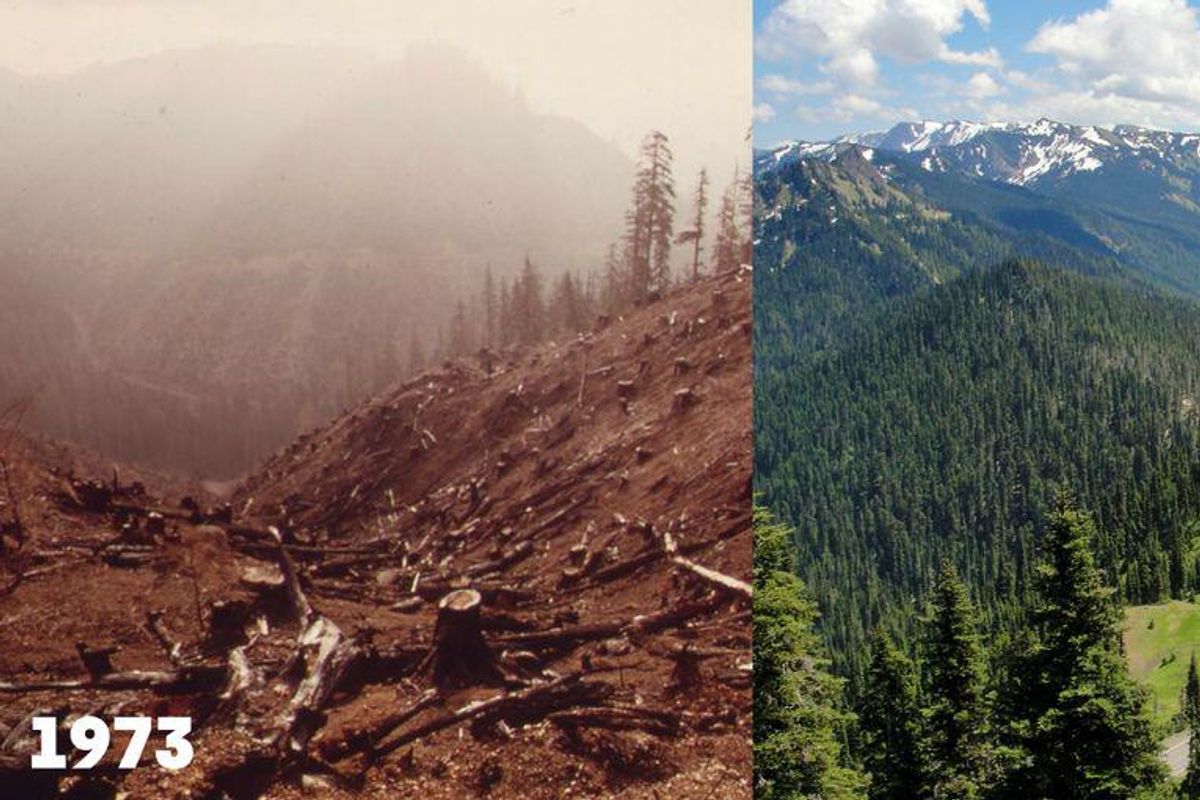32 years separate this before and after of a beautiful Washington forest. Take a look.
Our relationship with our planet can be mutually beneficial if we commit ourselves to sustainability.

A return to green over decades.
Douglas Scott grew up on Washington's Olympic Peninsula in the dying shadow of the timber industry that had supported the region for decades.
"Nearly every home had a bright orange or yellow sign reading 'This home supported by timber dollars,'" Scott wrote on Outdoor Society.
While the region has also been recognized for its succulent seafood, temperate climate, and stunning natural formations, nothing shaped the community — or the physical landscape — quite like logging did.

Logging repercussions felt on the Olympic Peninsula.
Olympic Peninsula, circa 1972. Photo from the Records of the Environmental Protection Agency.
The tension in the air between the loggers and the environmentalists throughout the 1980s was thicker than the trees being cut down.
"I heard from old timers in the Harbor about how environmentalists were ruining the region, and I was told by environmentalists that loggers were killing everything in sight," Scott recalled.
But to understand the full impact of deforestation on the region, it helps to take the bird's eye view.
Here's a satellite image of the Olympic Peninsula from 1984. The white region in the center are the mountaintops in Olympic National Park; you'll also notice the grey and brown areas along the western and northern coasts of the peninsula.

Satellite image of deforestation on the region of the Olympic Peninsula.
Screenshot via GoogleEarth Engine.
"When I moved away from the area in 1997, there wasn't much of a logging or mill economy in dozens of towns around the region," Scott said.
By that time, tourism had begun to take the place of timber as the region's major industry — which was probably helped along by the fact that the trees were slowly but surely starting to recover, enhancing the already stunning vistas that drew visitors.
Here's how the Olympic Peninsula looked by the time that Scott and his family left the area; you'll notice the western and northern coasts are just a little bit greener than they were 13 years prior...

Some green coming back.
Screenshot via GoogleEarth Engine.
Those great green arbors continued their gradual recovery into the 2000s...

More forest returns to the peninsula.
Screenshot via GoogleEarth Engine.
And they're still going today.

And still more green comes back.
Screenshot via GoogleEarth Engine.
But those isolated moments don't tell the whole story of the region's recovery. It's even more remarkable when you can see it in action...

Olympic Peninsula demonstrating the power of nature.
GIF via GoogleEarth Engine.
We don't always notice the world changing right before our eyes, but the decades-long view of the Olympic Peninsula shows the true power of nature.
It's not just the trees, either; according to Scott, the replenished forests have also had a positive impact on the local salmon population and other treasured natural resources.

Mother Nature doing her thing.
Left photo from Records of the Environmental Protection Agency; Right, by Miguel Vieira/Flickr.
That doesn't mean we shouldn't use the natural world, of course. We still need wood, for example, but now we know there are sustainable ways to use it without recklessly damaging to the planet.
The Earth was built to take care of itself. We just need to let Mother Nature do her thing.
This article originally appeared on 12.22.16






 A woman is getting angry at her coworker.via
A woman is getting angry at her coworker.via  A man with tape over his mouth.via
A man with tape over his mouth.via  A husband is angry with his wife. via
A husband is angry with his wife. via 
 Curling requires more athleticism than it first appears.
Curling requires more athleticism than it first appears.
 When you meet someone in Japan for the first time, you say "hajimemashite," which literally translates as "first time."
When you meet someone in Japan for the first time, you say "hajimemashite," which literally translates as "first time." Sharing your age in Japan involves a whole other way of measuring time.
Sharing your age in Japan involves a whole other way of measuring time.

 Comfort in a hug: a shared moment of empathy and support.
Comfort in a hug: a shared moment of empathy and support. A comforting hug during an emotional moment.
A comforting hug during an emotional moment. Woman seated against brick wall, covering ears with hands.
Woman seated against brick wall, covering ears with hands.